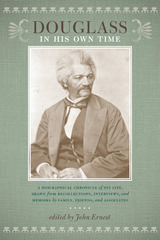
As valuable as these writings are in illuminating the man, the story Douglass told in 1845 has become rather too easy to tell, obscuring as much as it reveals. Less a living presence than an inspiring tale, Frederick Douglass remains relatively unknown even to many of those who celebrate his achievements. Douglass in His Own Time offers an introduction to Douglass the man by those who knew him. The book includes a broad range of writings, some intended for public viewing and some private correspondence, all of which contend with the force of Douglass’s tremendous power over the written and spoken word, his amazing presence before crowds, his ability to improvise, to entertain, to instruct, to inspire—indeed, to change lives through his eloquent appeals to righteous self-awareness and social justice. In approaching Douglass through the biographical sketches, memoirs, letters, editorials, and other articles about him, readers will encounter the complexity of a life lived on a very public stage, the story of an extraordinary black man in an insistently white world.

The Escape centers on the attempted sexual violation of a slave and involves many characters of mixed race, through which Brown commented on such themes as moral decay, white racism, and black self-determination. Rich in action and faithful in dialect, it raises issues relating not only to race but also to gender by including concepts of black and white masculinity and the culture of southern white and enslaved women. It portrays a world in which slavery provided a convenient means of distinguishing between the white North and the white South, allowing northerners to express moral sentiments without recognizing or addressing the racial prejudice pervasive among whites in both regions.
John Ernest’s introductory essay balances the play's historical and literary contexts, including information on Brown and his career, as well as on slavery, abolitionism, and sectional politics. It also discusses the legends and realities of the Underground Railroad, examines the role of antebellum performance art—including blackface minstrelsy and stage versions of Uncle Tom's Cabin—in the construction of race and national identity, and provides an introduction to theories of identity as performance.
A century and a half after its initial appearance, The Escape remains essential reading for students of African American literature. Ernest's keen analysis of this classic play will enrich readers’ appreciation of both the drama itself and the era in which it appeared.

J. McHenry Jones’s Hearts of Gold is a gripping tale of post-Civil War battles against racism and systemic injustice. Originally published in 1896, this novel reveals an African American community of individuals dedicated to education, journalism, fraternal organizations, and tireless work serving the needs of those abandoned by the political process of the white world. Jones challenges conventional wisdom by addressing a range of subjects—from interracial relationships to forced labor in coal mines—that virtually no other novelist of the time was willing to approach. With the addition of an introduction and appendix, this new edition reveals the difficult foundations upon which African Americans built a platform to address injustice; generate opportunities; and play a prominent role in American social, economic, and political life.
READERS
Browse our collection.
PUBLISHERS
See BiblioVault's publisher services.
STUDENT SERVICES
Files for college accessibility offices.
UChicago Accessibility Resources
home | accessibility | search | about | contact us
BiblioVault ® 2001 - 2024
The University of Chicago Press









